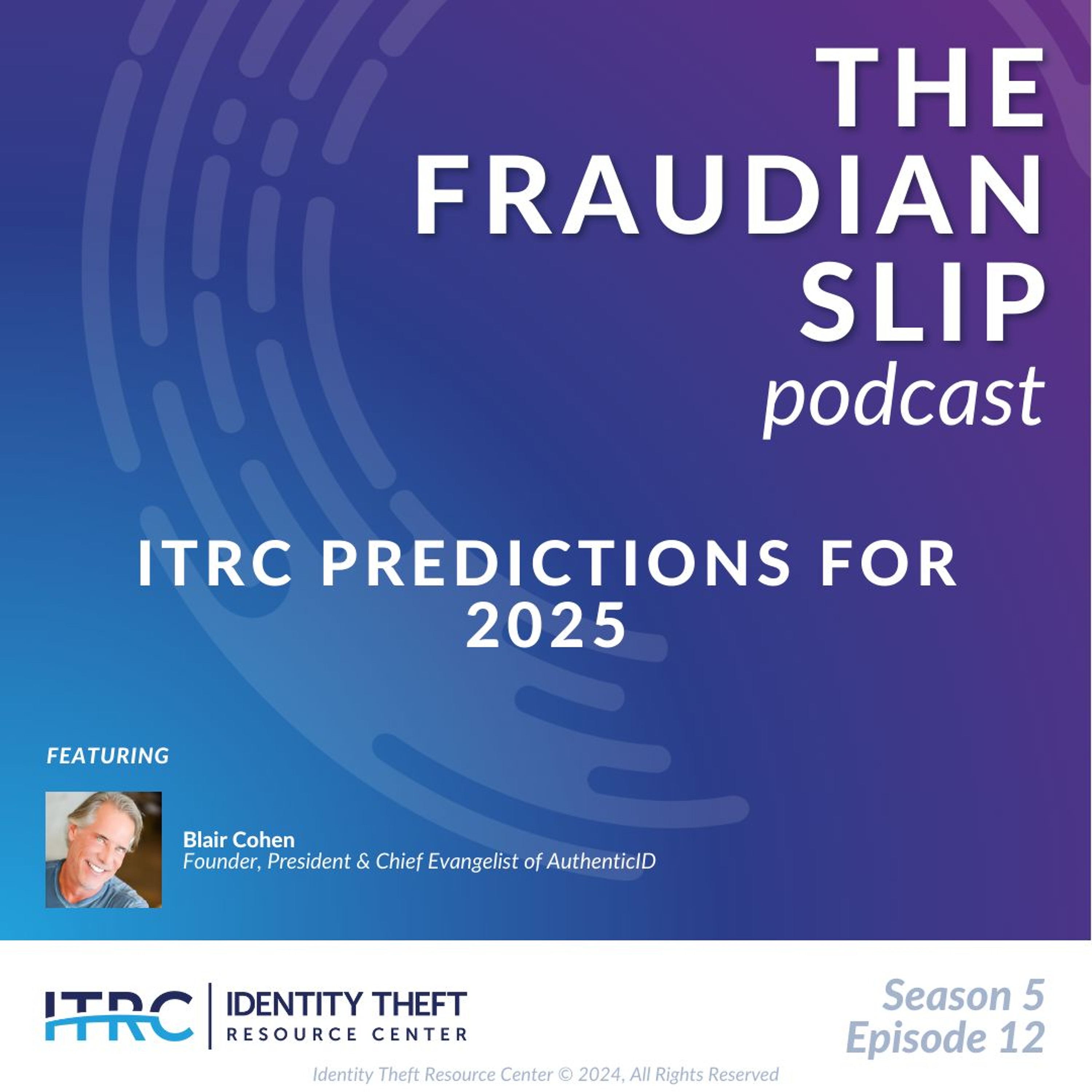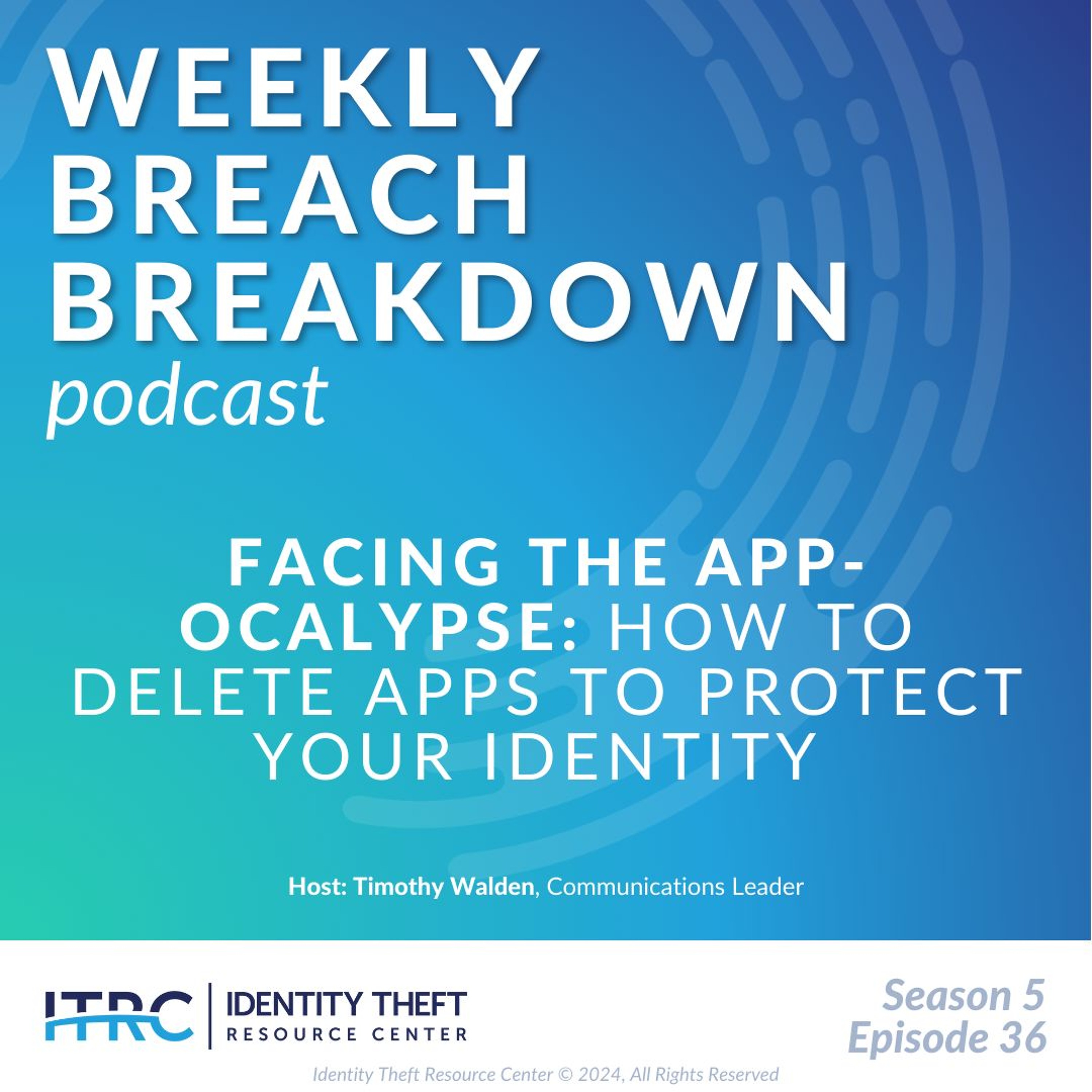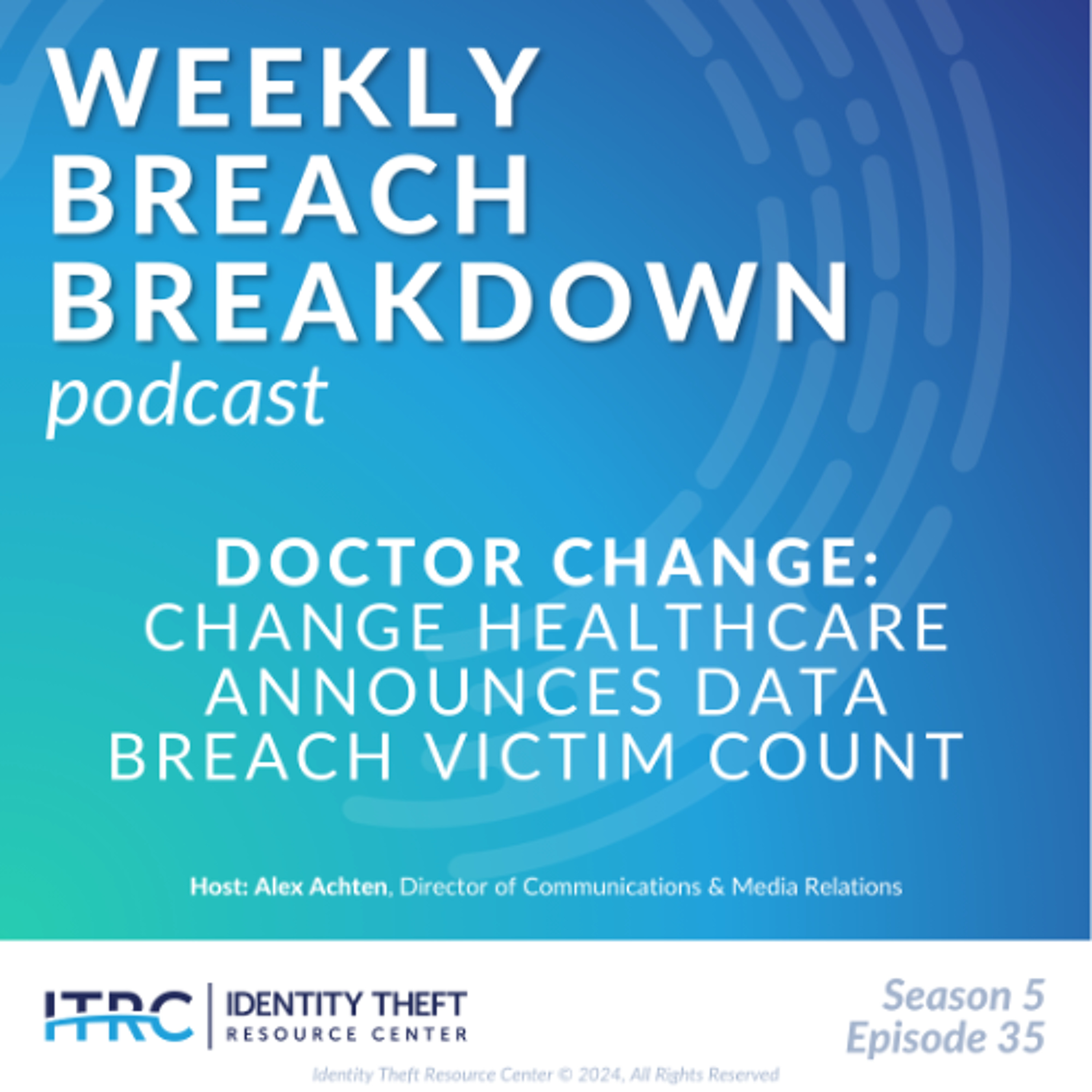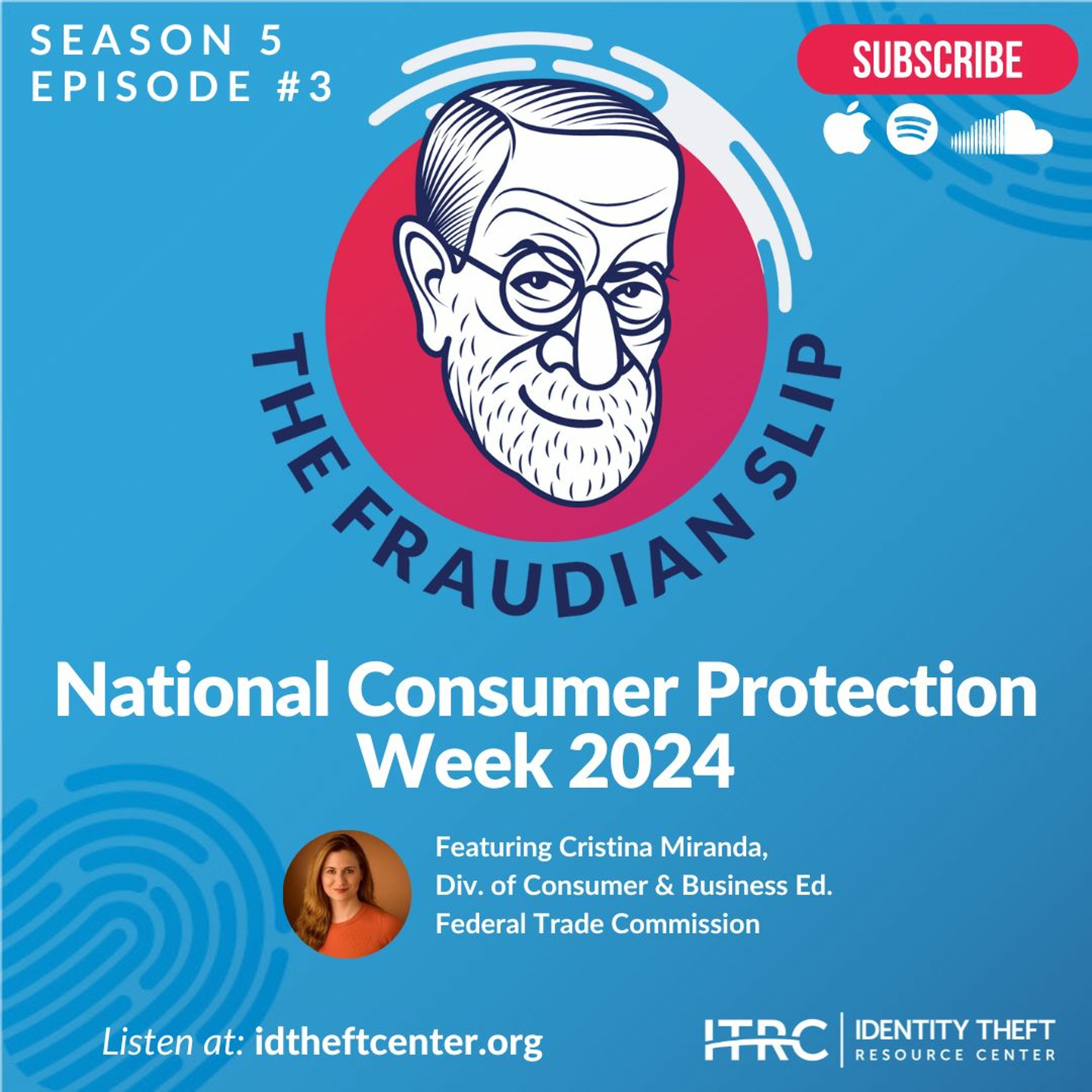I’m James Lee, the COO of the ITRC - thanks for joining us today. This is National Consumer Protection Week, an annual event led by the Federal Trade Commission to highlight the risks of consumers being a victim of fraud and the resources available to them to prevent or recover from fraud.
Show Notes
Follow on LinkedIn: www.linkedin.com/company/idtheftcenter/
Follow on X: twitter.com/IDTheftCenter
Show Transcript
Welcome to The Fraudian Slip, the Identity Theft Resource Center’s (ITRC) podcast, where we talk about all things identity compromise, crime and fraud that impact people and businesses. Listen on Apple, Google, Spotify, SoundCloud, Audible and Amazon now.
It is National Consumer Protection Week, an annual event led by the Federal Trade Commission (FTC) to highlight the risks of consumers being victims of fraud and the resources available to them to prevent or recover from fraud.
This is also the time of the year when we get a better picture of fraud trends in the previous year. In January, the ITRC released our comprehensive report on data breaches in 2023 – the highest year ever for data compromises. A few weeks ago, the FTC released its annual data report on the scope and scale of fraud reported in the United States during the past year.
At the risk of understatement – in 2023, identity crimes and other consumer fraud were booming.
Here to talk about National Consumer Protection Week, what risks consumers and businesses face in this “fraudemic,” and how we can all be better prepared to avoid becoming a victim is Cristina Miranda of the FTC’s Division of Consumer & Business Education and, the ITRC’s CEO, Eva Velasquez.
Welcome to you both!
EVA: The ITRC reported a 78 percent year-over-year increase in data breaches back in January, but that’s just one of the trends we’ve seen move in the wrong direction over the past year. What stands out to you as you look at our data?
CRISTINA: Tell us about Sentinel – how it’s collected, from whom, and what does the 2023 data show?
First, thank you for inviting me here on the podcast. It’s great to be here.
When people report fraud or other bad business practices to the FTC, that information goes into the Consumer Sentinel Network database – along with reports people made to other federal and state agencies, and groups like the BBB and AARP. Sentinel is a secure online database that provides federal, state and local law enforcement agencies with access to reports from consumers about fraud, identity theft and other consumer problems. So, all the reports to Sentinel help us look for patterns and trends to identify enforcement targets and to alert the public to trending scams.
We just released the data from fraud reports we received in 2023, which tells us that people lost $10 billion to scams last year. That’s $1 billion more than in 2022 and the highest ever in reported losses to the FTC – even though the number of reports (2.6 million) was about the same as last year. One in four people who reported fraud also reported losing money to scams, with a median loss of $500 per person. Email was the number one contact method reported last year (for years, it was the phone). Examples of these phishing emails are emails where scammers pretend to be a business or government agency to steal money.
EVA: With $10 billion being reported to the FTC as lost in some form of a scam, what are victims telling the ITRC staff about their losses?
CRISTINA: One of the Sentinel stats that jumps out is the rise in losses connected to imposter scams. We talk a lot about social engineering and impersonation on our podcasts – what does the FTC make of this big jump in losses due to imposters?
According to the 2023 Consumer Sentinel Data Book, imposter scams remained the top fraud category, with reported losses of $2.7 billion with a median loss of $800 per person. These imposter scams include all types of impersonators – people pretending to be your bank’s fraud department, the government (like the IRS, Social Security and even the FTC), a relative in distress, a well-known business or a technical support expert.
The truth is scammers continue to evolve and find new ways to scam people to steal personal or financial information and money. For example, here’s a new twist on imposter scams that we’re seeing. It starts with a call about some kind of problem – maybe a suspicious credit card charge at Amazon. Pretty quickly, though, it turns serious when the caller says they just noticed someone’s using your information to commit a crime and that your money is at “risk.” Then they’ll transfer you to someone who can help, but that person is also an imposter. A lot of times, that someone is a scammer pretending to be an FTC agent who says they’ll help you protect your money.
Now, none of this is true: there’s no suspicious charge, no serious crime, your money’s not at risk and nobody from the FTC does anything like this. However, scammers are convincing, and we’re hearing from people who’ve lost their entire bank account or retirement savings to a scammer, thinking they’re protecting it.
EVA: Whenever we talk to the media or any group of individuals, the same question comes up – what can a person do to protect themselves these days?
CRISTINA: The same question about consumers, but also the FTC has the unique power to hold businesses accountable when their actions run afoul of data privacy and security rules. What can you do to help consumers, and what are you doing to hold businesses accountable?
The best way to protect yourself from fraud and scams is to stay informed. When you know about the scammers’ tactics you can spot the scam and avoid them. Sign up for the FTC’s free alerts at ftc.gov/ConsumerAlerts. They’ll help you know what scammers are up to and will also help you talk to others about scams and spread the word among friends, family and others in your community. Both research and experience say that talking about a scam helps you avoid it, but it also helps people you care about avoid the scam, too.
It’s also important to share your story and report the frauds and scams you see to the FTC at ReportFraud.ftc.gov. Scammers don’t just scam one person, so if you see or experience fraud, a scam or any bad business practice, help your community, help protect your friends and family by reporting it to the FTC. Every time you file a report with the FTC, you give a piece of the puzzle that helps us build cases, stop scammers and also alert others about the current trends. In just a few short steps, you can report fraud in English at ReportFraud.ftc.gov and in Spanish at ReporteFraude.ftc.gov.
For the question on what the FTC is doing to hold businesses accountable, the FTC does this in many ways. The agency investigates and takes legal action against businesses that engage in unfair and deceptive practices. It enforces laws related to consumer protection, antitrust and privacy. When violations occur, the FTC imposes fines or requires companies to change their practices. The FTC also educates businesses on compliance and monitors markets to ensure fair competition.
EVA & CRISTINA: Last question – What can be done to turn around the trends we discussed today – or at least flatten the curve?
It’s the FTC’s mission to help protect people from fraud, identity theft and other consumer protection issues. That’s why we are working together with the ITRC and other partners for National Consumer Protection Week. It’s important to share information to let people know about their consumer rights and learn how to spot, report and avoid scams.
The FTC has consumer education information in a dozen languages ─ from Amharic to Vietnamese, in addition to English and Spanish ─ to help people spot and avoid scams. They are online at ftc.gov/languages and available to order in print for free in Chinese, Korean and Vietnamese.
Reporting fraud is also very important in the fight against scams. As I mentioned, when people report fraud, they’re helping stop scams and alert others in their community. Reporting is easy online in English at ReportFraud.ftc.gov or in Spanish at ReporteFraud.ftc.gov.
We also take reports in languages besides English and Spanish. To report in other languages, call 877.382.4357 and press 3 to select your preferred language. Phone lines are open between 9 a.m. and 5 p.m. EST.
Contact the ITRC
If you want to dig deeper into the 2023 Consumer Sentinel data, visit the FTC website www.ftc.gov/data. To learn more about National Consumer Protection Week 2024, click here.
If you think you have been the victim of an identity crime or want to avoid becoming a victim, you can speak with an expert advisor on the phone (888.400.5530), chat live on the web or send us an email during our normal business hours (6 a.m.-5 p.m. PST Monday-Friday). Just visit www.idtheftcenter.org to get started.
We will be back next week with a new episode of our sister podcast, the Weekly Breach Breakdown, and next month with another episode of the Fraudian Slip.
Listen On
Also In Season 5
-

The Fraudian Slip Podcast - 2025 Predictions
Welcome to the Fraudian Slip…the Identity Theft Resource Center’s podcast where -

The Weekly Breach Breakdown Podcast by ITRC - Copyrightcat - S5E37
Welcome back to the Identity Theft Resource Center’s Weekly Breach Breakdown – s -

The Weekly Breach Breakdown Podcast by ITRC - Facing the App-ocalypse - S5E36
Welcome to the Identity Theft Resource Center's Weekly Breach Breakdown for Nove -

The Weekly Breach Breakdown Podcast by ITRC - Doctor Change - S5E35
Welcome to the Identity Theft Resource Center's Weekly Breach Breakdown for Nove
